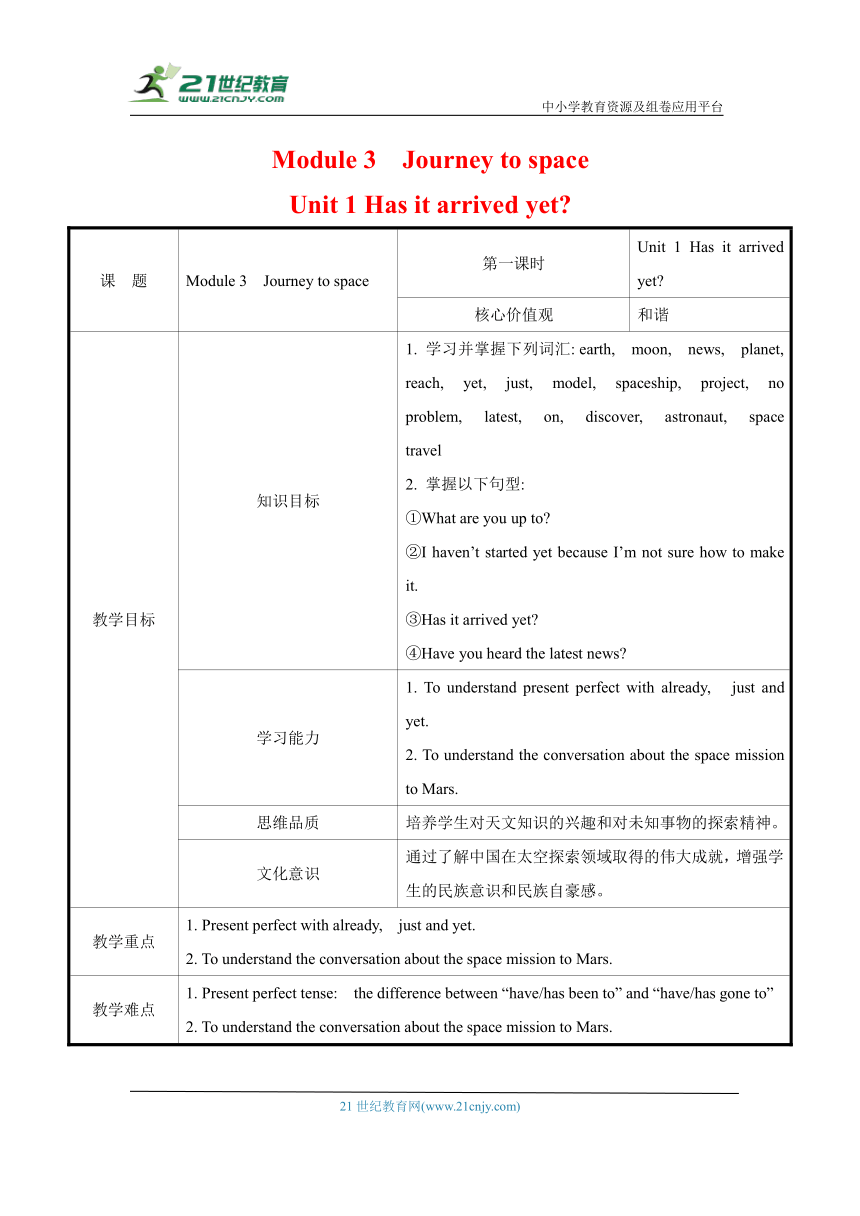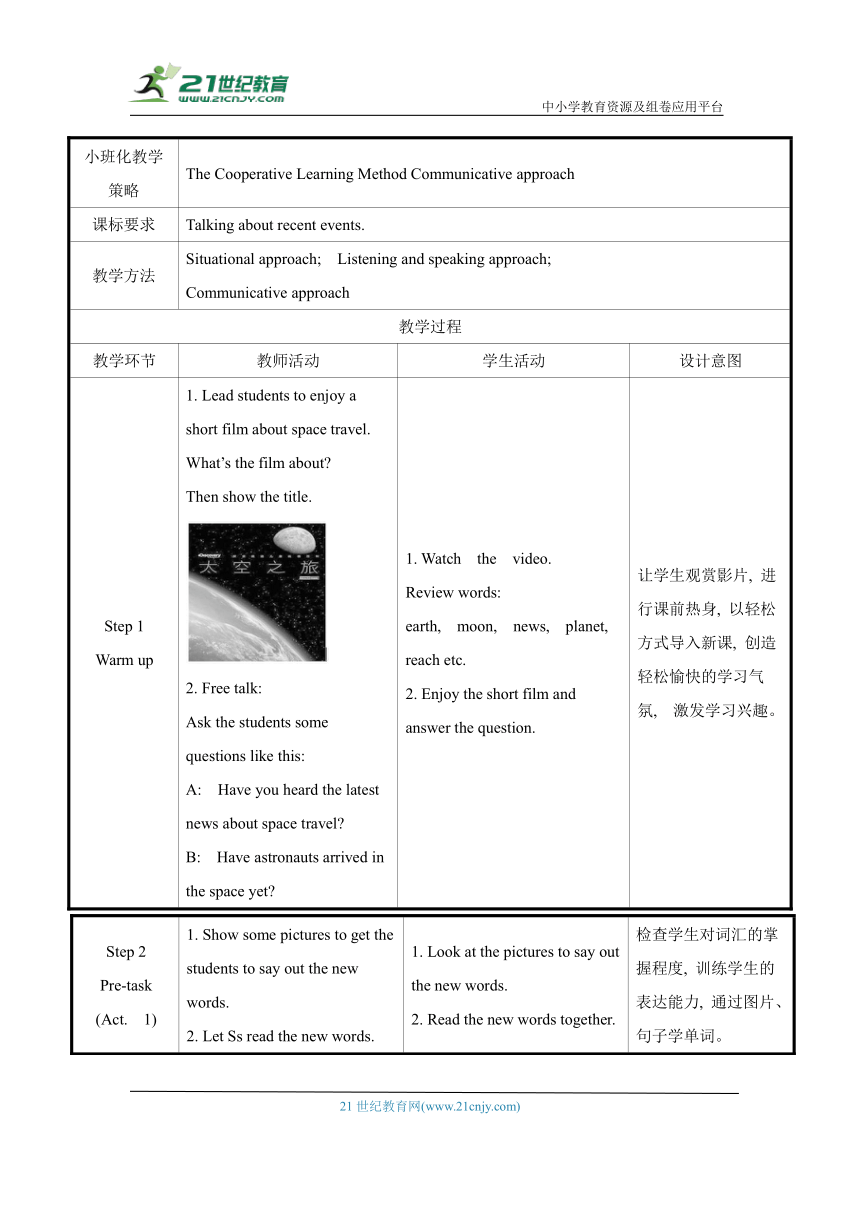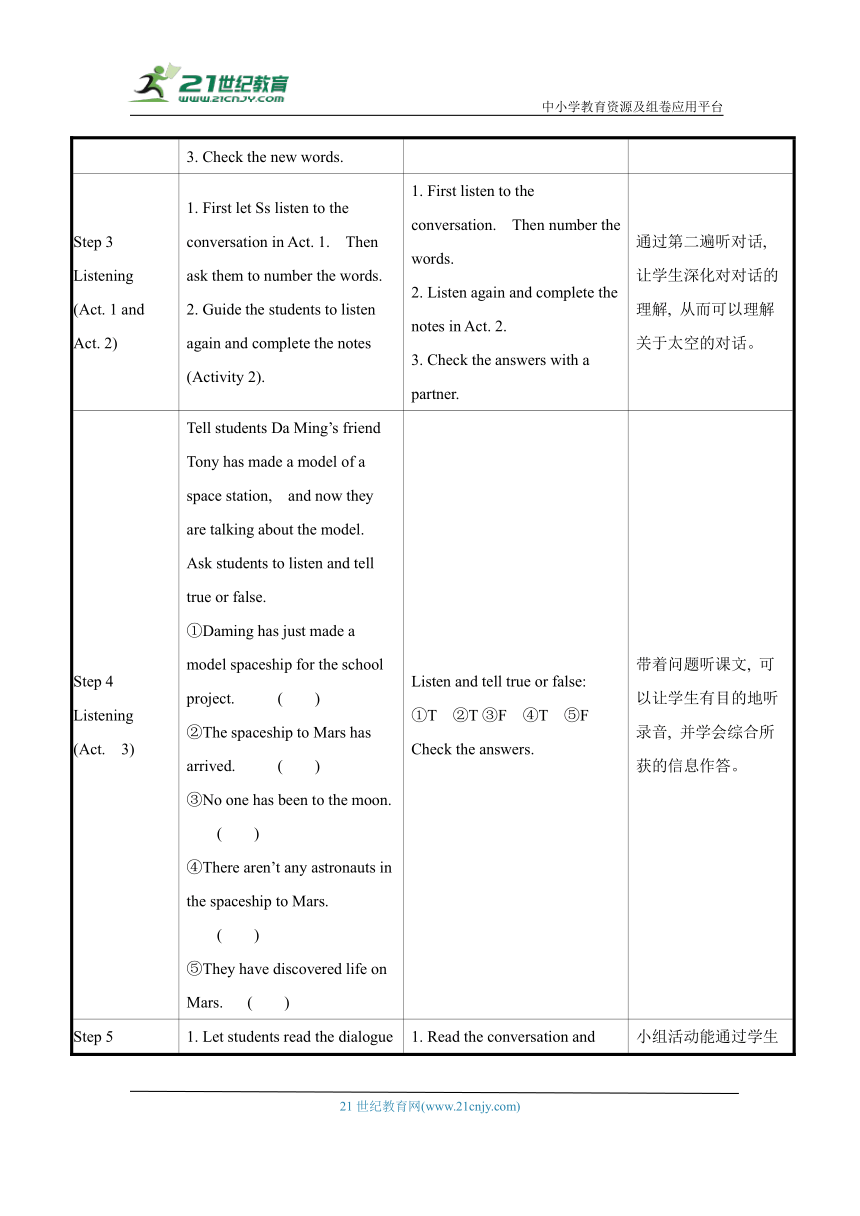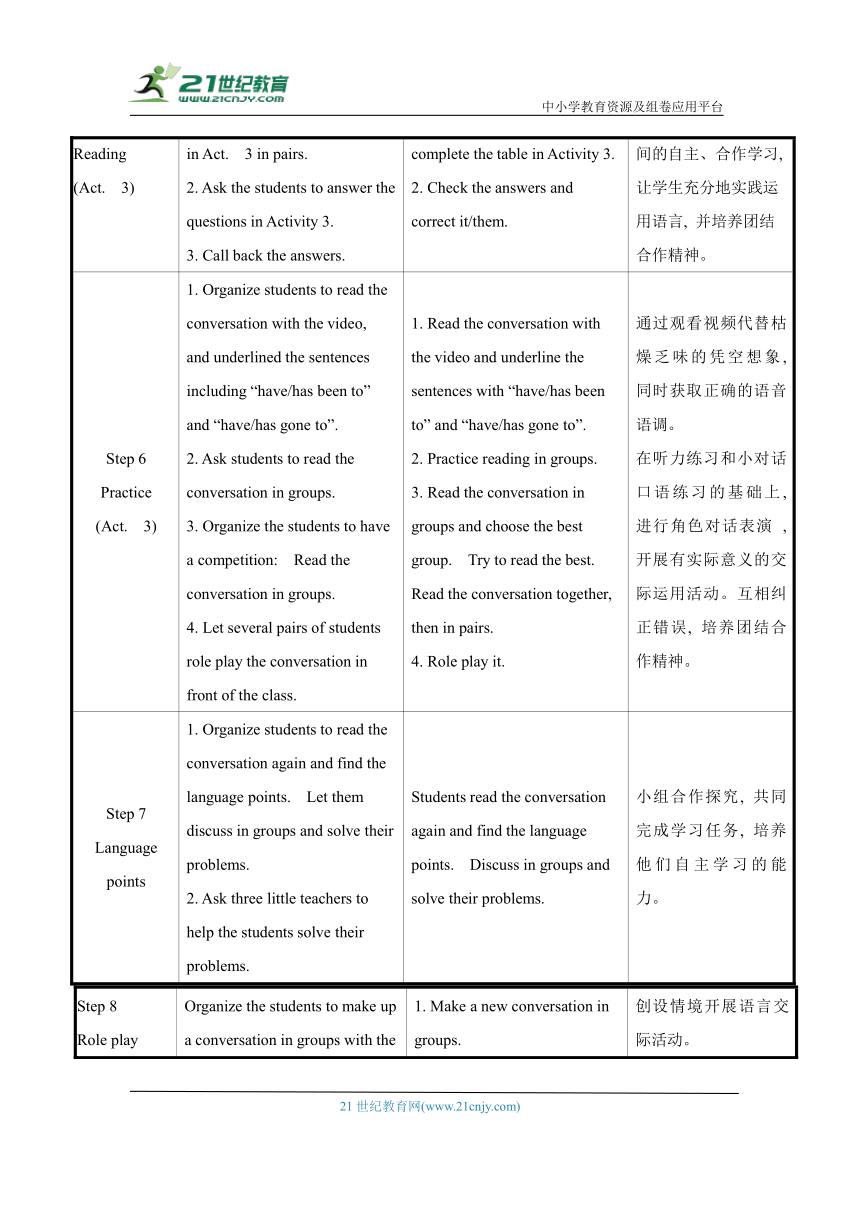(新课标)Module 3 Journey to space Unit 1 Has it arrived yet?表格式教案(外研版八下)
文档属性
| 名称 | (新课标)Module 3 Journey to space Unit 1 Has it arrived yet?表格式教案(外研版八下) |

|
|
| 格式 | docx | ||
| 文件大小 | 59.6KB | ||
| 资源类型 | 试卷 | ||
| 版本资源 | 外研版 | ||
| 科目 | 英语 | ||
| 更新时间 | 2024-05-14 00:00:00 | ||
图片预览




文档简介
中小学教育资源及组卷应用平台
Module 3 Journey to space
Unit 1 Has it arrived yet
课 题 Module 3 Journey to space 第一课时 Unit 1 Has it arrived yet
核心价值观 和谐
教学目标 知识目标 1. 学习并掌握下列词汇: earth, moon, news, planet, reach, yet, just, model, spaceship, project, no problem, latest, on, discover, astronaut, space travel 2. 掌握以下句型: ①What are you up to ②I haven’t started yet because I’m not sure how to make it. ③Has it arrived yet ④Have you heard the latest news
学习能力 1. To understand present perfect with already, just and yet. 2. To understand the conversation about the space mission to Mars.
思维品质 培养学生对天文知识的兴趣和对未知事物的探索精神。
文化意识 通过了解中国在太空探索领域取得的伟大成就,增强学生的民族意识和民族自豪感。
教学重点 1. Present perfect with already, just and yet. 2. To understand the conversation about the space mission to Mars.
教学难点 1. Present perfect tense: the difference between “have/has been to” and “have/has gone to” 2. To understand the conversation about the space mission to Mars.
小班化教学策略 The Cooperative Learning Method Communicative approach
课标要求 Talking about recent events.
教学方法 Situational approach; Listening and speaking approach; Communicative approach
教学过程
教学环节 教师活动 学生活动 设计意图
Step 1 Warm up 1. Lead students to enjoy a short film about space travel. What’s the film about Then show the title. 2. Free talk: Ask the students some questions like this: A: Have you heard the latest news about space travel B: Have astronauts arrived in the space yet 1. Watch the video. Review words: earth, moon, news, planet, reach etc. 2. Enjoy the short film and answer the question. 让学生观赏影片, 进行课前热身, 以轻松方式导入新课, 创造轻松愉快的学习气氛, 激发学习兴趣。
Step 2 Pre-task (Act. 1) 1. Show some pictures to get the students to say out the new words. 2. Let Ss read the new words. 3. Check the new words. 1. Look at the pictures to say out the new words. 2. Read the new words together. 检查学生对词汇的掌握程度, 训练学生的表达能力, 通过图片、句子学单词。
Step 3 Listening (Act. 1 and Act. 2) 1. First let Ss listen to the conversation in Act. 1. Then ask them to number the words. 2. Guide the students to listen again and complete the notes (Activity 2). 1. First listen to the conversation. Then number the words. 2. Listen again and complete the notes in Act. 2. 3. Check the answers with a partner. 通过第二遍听对话, 让学生深化对对话的理解, 从而可以理解关于太空的对话。
Step 4 Listening (Act. 3) Tell students Da Ming’s friend Tony has made a model of a space station, and now they are talking about the model. Ask students to listen and tell true or false. ①Daming has just made a model spaceship for the school project. ( ) ②The spaceship to Mars has arrived. ( ) ③No one has been to the moon. ( ) ④There aren’t any astronauts in the spaceship to Mars. ( ) ⑤They have discovered life on Mars. ( ) Listen and tell true or false: ①T ②T ③F ④T ⑤F Check the answers. 带着问题听课文, 可以让学生有目的地听录音, 并学会综合所获的信息作答。
Step 5 Reading (Act. 3) 1. Let students read the dialogue in Act. 3 in pairs. 2. Ask the students to answer the questions in Activity 3. 3. Call back the answers. 1. Read the conversation and complete the table in Activity 3. 2. Check the answers and correct it/them. 小组活动能通过学生间的自主、合作学习, 让学生充分地实践运用语言, 并培养团结合作精神。
Step 6 Practice (Act. 3) 1. Organize students to read the conversation with the video, and underlined the sentences including “have/has been to” and “have/has gone to”. 2. Ask students to read the conversation in groups. 3. Organize the students to have a competition: Read the conversation in groups. 4. Let several pairs of students role play the conversation in front of the class. 1. Read the conversation with the video and underline the sentences with “have/has been to” and “have/has gone to”. 2. Practice reading in groups. 3. Read the conversation in groups and choose the best group. Try to read the best. Read the conversation together, then in pairs. 4. Role play it. 通过观看视频代替枯燥乏味的凭空想象, 同时获取正确的语音语调。 在听力练习和小对话口语练习的基础上, 进行角色对话表演 , 开展有实际意义的交际运用活动。互相纠正错误, 培养团结合作精神。
Step 7 Language points 1. Organize students to read the conversation again and find the language points. Let them discuss in groups and solve their problems. 2. Ask three little teachers to help the students solve their problems. Students read the conversation again and find the language points. Discuss in groups and solve their problems. 小组合作探究, 共同完成学习任务, 培养他们自主学习的能力。
Step 8 Role play Organize the students to make up a conversation in groups with the tips below. 1. Make a new conversation in groups. 2. Give a dialogue show. 创设情境开展语言交际活动。
Step 9 Exercises 1. Ask students to complete the passage(Activity 4). 2. Ask Ss to retell the plete the sentences with the words in the box. (Activity 4). 通过活动4习题巩固本课所学内容, 加深印象。
Step 10 Speaking practice 1. Pronunciation and speaking: 1) Guide the students to listen and underline the words the speaker stresses, then check the answers. 2) Play the recording again and ask the whole class to repeat, then check their speaking. 2. Show some information about the things what we have and have not done in space travel. Help the students make lists of what we have and have not done in space travel in groups. (Act. 6) We have. . . We have not. . . 3. According to the lists, help the students talk about them like this: A: Have we sent a spaceship to Mars B: Yes, we have. But no one has been to Mars yet. A: Why haven’t we been to Mars B: . . . 4. Have the Ss work in pairs. Talk about space travel with the lists, then check their ideas with their workmates. —Have we. . . —Yes, we have. / No, we haven’t. 5. Ask students to do some exercises and then check. 1. Pronunciation and speaking: 1)Listen and underline the words the speaker stresses, then check the answers. 2) Listen and repeat the sentences, then show speaking. 2. Think about the pictures about the things what we have and have not done in space travel. Make lists of what we have and have not done in space travel in groups. (Act. 6) We have. . . /We have not. . . 3. According to the lists, talk about them like this: A: Have we sent a spaceship to Mars B: Yes, we have. But no one has been to Mars yet. A: Why haven’t we been to Mars B: . . . 4. Work in pairs. Talk about space travel with the lists, then share their ideas with their workmates. —Have we. . . —Yes, we have. / No, we haven’t. 5. Do some exercises and then check. 通过做口头表达训练学生说的能力, 能使学生加深对课文内容的理解, 适量的口头练习, 让学生巩固本课时的语言重点。 通过笔头练习, 进一步巩固所学知识。
Step 11 Summarize 1. Get the students to sum up the language points. T: What have we learned today S: . . . 2. Let the students choose the best group in this lesson. 1. Sum up the language points: ①the differences between “have/has been to” and “have/has gone to” ②Useful sentences: I haven’t started yet because I’m not sure how to make it. . . . 2. Choose the best groups. 引导学生对这节课做总结, 培养学生自主学习, 自主总结的良好学习习惯。
Step 12 Consolidation 教师设置巩固检测练习: Ⅰ. 用just, already, yet填空 1. They’ve _________seen the film twice. It’s wonderful. 2. Has David come back from New York ______ 3. Mum, I’ve ___ finished my homework. Can I play football 4. They’ve _________ heard the news. Now, they’re talking about it. 5. Xiao Ming hasn’t returned _________. His mother is angry. Ⅱ. 用have/has gone或 have/has been填空 1. —Where are the boy students —They _________to the school factory. 2. —Is your father at home —No, he _________to Shenzhen. 3. —_________ he ever _________there before —Yes, he _________there several times. Keys: Ⅰ. 1. already 2. yet 3. already 4. just 5. yet Ⅱ. 1. have gone 2. has gone 3. Has; been; has been 独立完成检测练习, 进行自我评价。 通过检测练习, 便于学生了解自己对本节课的词汇、句型、语法等的掌握情况。
Step 13 Homework 1. Search the Internet, and try to find some materials about the eight planets of the sun. Talk about the space mission to Mars. 2. Read the conversation of Activity 3 after the tape. 3. Copy the new words.
板书设计 Unit 1 Has it arrived yet 1. New words and phrases: earth, moon, news, planet, reach, yet, just, model, spaceship, project, no problem, latest, on, discover, astronaut, space travel 2. Sentences: ①What are you up to ②I haven’t started yet because I’m not sure how to make it. ③Has it arrived yet ④Have you heard the latest news 3. have/has gone to与have/has been to的区别
教学反思 在教学过程中应注意处理好知识学习与能力发展的关系、语言操练与语言运用的关系以及常规教学与考试的关系, 使教学活动更加有效, 使课堂上设计的活动有明确的交流目的、真实的交流意义和具体的操作要求。
21世纪教育网(www.21cnjy.com)
Module 3 Journey to space
Unit 1 Has it arrived yet
课 题 Module 3 Journey to space 第一课时 Unit 1 Has it arrived yet
核心价值观 和谐
教学目标 知识目标 1. 学习并掌握下列词汇: earth, moon, news, planet, reach, yet, just, model, spaceship, project, no problem, latest, on, discover, astronaut, space travel 2. 掌握以下句型: ①What are you up to ②I haven’t started yet because I’m not sure how to make it. ③Has it arrived yet ④Have you heard the latest news
学习能力 1. To understand present perfect with already, just and yet. 2. To understand the conversation about the space mission to Mars.
思维品质 培养学生对天文知识的兴趣和对未知事物的探索精神。
文化意识 通过了解中国在太空探索领域取得的伟大成就,增强学生的民族意识和民族自豪感。
教学重点 1. Present perfect with already, just and yet. 2. To understand the conversation about the space mission to Mars.
教学难点 1. Present perfect tense: the difference between “have/has been to” and “have/has gone to” 2. To understand the conversation about the space mission to Mars.
小班化教学策略 The Cooperative Learning Method Communicative approach
课标要求 Talking about recent events.
教学方法 Situational approach; Listening and speaking approach; Communicative approach
教学过程
教学环节 教师活动 学生活动 设计意图
Step 1 Warm up 1. Lead students to enjoy a short film about space travel. What’s the film about Then show the title. 2. Free talk: Ask the students some questions like this: A: Have you heard the latest news about space travel B: Have astronauts arrived in the space yet 1. Watch the video. Review words: earth, moon, news, planet, reach etc. 2. Enjoy the short film and answer the question. 让学生观赏影片, 进行课前热身, 以轻松方式导入新课, 创造轻松愉快的学习气氛, 激发学习兴趣。
Step 2 Pre-task (Act. 1) 1. Show some pictures to get the students to say out the new words. 2. Let Ss read the new words. 3. Check the new words. 1. Look at the pictures to say out the new words. 2. Read the new words together. 检查学生对词汇的掌握程度, 训练学生的表达能力, 通过图片、句子学单词。
Step 3 Listening (Act. 1 and Act. 2) 1. First let Ss listen to the conversation in Act. 1. Then ask them to number the words. 2. Guide the students to listen again and complete the notes (Activity 2). 1. First listen to the conversation. Then number the words. 2. Listen again and complete the notes in Act. 2. 3. Check the answers with a partner. 通过第二遍听对话, 让学生深化对对话的理解, 从而可以理解关于太空的对话。
Step 4 Listening (Act. 3) Tell students Da Ming’s friend Tony has made a model of a space station, and now they are talking about the model. Ask students to listen and tell true or false. ①Daming has just made a model spaceship for the school project. ( ) ②The spaceship to Mars has arrived. ( ) ③No one has been to the moon. ( ) ④There aren’t any astronauts in the spaceship to Mars. ( ) ⑤They have discovered life on Mars. ( ) Listen and tell true or false: ①T ②T ③F ④T ⑤F Check the answers. 带着问题听课文, 可以让学生有目的地听录音, 并学会综合所获的信息作答。
Step 5 Reading (Act. 3) 1. Let students read the dialogue in Act. 3 in pairs. 2. Ask the students to answer the questions in Activity 3. 3. Call back the answers. 1. Read the conversation and complete the table in Activity 3. 2. Check the answers and correct it/them. 小组活动能通过学生间的自主、合作学习, 让学生充分地实践运用语言, 并培养团结合作精神。
Step 6 Practice (Act. 3) 1. Organize students to read the conversation with the video, and underlined the sentences including “have/has been to” and “have/has gone to”. 2. Ask students to read the conversation in groups. 3. Organize the students to have a competition: Read the conversation in groups. 4. Let several pairs of students role play the conversation in front of the class. 1. Read the conversation with the video and underline the sentences with “have/has been to” and “have/has gone to”. 2. Practice reading in groups. 3. Read the conversation in groups and choose the best group. Try to read the best. Read the conversation together, then in pairs. 4. Role play it. 通过观看视频代替枯燥乏味的凭空想象, 同时获取正确的语音语调。 在听力练习和小对话口语练习的基础上, 进行角色对话表演 , 开展有实际意义的交际运用活动。互相纠正错误, 培养团结合作精神。
Step 7 Language points 1. Organize students to read the conversation again and find the language points. Let them discuss in groups and solve their problems. 2. Ask three little teachers to help the students solve their problems. Students read the conversation again and find the language points. Discuss in groups and solve their problems. 小组合作探究, 共同完成学习任务, 培养他们自主学习的能力。
Step 8 Role play Organize the students to make up a conversation in groups with the tips below. 1. Make a new conversation in groups. 2. Give a dialogue show. 创设情境开展语言交际活动。
Step 9 Exercises 1. Ask students to complete the passage(Activity 4). 2. Ask Ss to retell the plete the sentences with the words in the box. (Activity 4). 通过活动4习题巩固本课所学内容, 加深印象。
Step 10 Speaking practice 1. Pronunciation and speaking: 1) Guide the students to listen and underline the words the speaker stresses, then check the answers. 2) Play the recording again and ask the whole class to repeat, then check their speaking. 2. Show some information about the things what we have and have not done in space travel. Help the students make lists of what we have and have not done in space travel in groups. (Act. 6) We have. . . We have not. . . 3. According to the lists, help the students talk about them like this: A: Have we sent a spaceship to Mars B: Yes, we have. But no one has been to Mars yet. A: Why haven’t we been to Mars B: . . . 4. Have the Ss work in pairs. Talk about space travel with the lists, then check their ideas with their workmates. —Have we. . . —Yes, we have. / No, we haven’t. 5. Ask students to do some exercises and then check. 1. Pronunciation and speaking: 1)Listen and underline the words the speaker stresses, then check the answers. 2) Listen and repeat the sentences, then show speaking. 2. Think about the pictures about the things what we have and have not done in space travel. Make lists of what we have and have not done in space travel in groups. (Act. 6) We have. . . /We have not. . . 3. According to the lists, talk about them like this: A: Have we sent a spaceship to Mars B: Yes, we have. But no one has been to Mars yet. A: Why haven’t we been to Mars B: . . . 4. Work in pairs. Talk about space travel with the lists, then share their ideas with their workmates. —Have we. . . —Yes, we have. / No, we haven’t. 5. Do some exercises and then check. 通过做口头表达训练学生说的能力, 能使学生加深对课文内容的理解, 适量的口头练习, 让学生巩固本课时的语言重点。 通过笔头练习, 进一步巩固所学知识。
Step 11 Summarize 1. Get the students to sum up the language points. T: What have we learned today S: . . . 2. Let the students choose the best group in this lesson. 1. Sum up the language points: ①the differences between “have/has been to” and “have/has gone to” ②Useful sentences: I haven’t started yet because I’m not sure how to make it. . . . 2. Choose the best groups. 引导学生对这节课做总结, 培养学生自主学习, 自主总结的良好学习习惯。
Step 12 Consolidation 教师设置巩固检测练习: Ⅰ. 用just, already, yet填空 1. They’ve _________seen the film twice. It’s wonderful. 2. Has David come back from New York ______ 3. Mum, I’ve ___ finished my homework. Can I play football 4. They’ve _________ heard the news. Now, they’re talking about it. 5. Xiao Ming hasn’t returned _________. His mother is angry. Ⅱ. 用have/has gone或 have/has been填空 1. —Where are the boy students —They _________to the school factory. 2. —Is your father at home —No, he _________to Shenzhen. 3. —_________ he ever _________there before —Yes, he _________there several times. Keys: Ⅰ. 1. already 2. yet 3. already 4. just 5. yet Ⅱ. 1. have gone 2. has gone 3. Has; been; has been 独立完成检测练习, 进行自我评价。 通过检测练习, 便于学生了解自己对本节课的词汇、句型、语法等的掌握情况。
Step 13 Homework 1. Search the Internet, and try to find some materials about the eight planets of the sun. Talk about the space mission to Mars. 2. Read the conversation of Activity 3 after the tape. 3. Copy the new words.
板书设计 Unit 1 Has it arrived yet 1. New words and phrases: earth, moon, news, planet, reach, yet, just, model, spaceship, project, no problem, latest, on, discover, astronaut, space travel 2. Sentences: ①What are you up to ②I haven’t started yet because I’m not sure how to make it. ③Has it arrived yet ④Have you heard the latest news 3. have/has gone to与have/has been to的区别
教学反思 在教学过程中应注意处理好知识学习与能力发展的关系、语言操练与语言运用的关系以及常规教学与考试的关系, 使教学活动更加有效, 使课堂上设计的活动有明确的交流目的、真实的交流意义和具体的操作要求。
21世纪教育网(www.21cnjy.com)
同课章节目录
- Module 1 Feelings and impressions
- Unit 1 It smells delicious.
- Unit 2 I feel nervous when I speak Chinese .
- Unit 3 Language in use
- Module 2 Experiences
- Unit 1 I've also entered lots of speaking competi
- Unit 2 They have seen the Pyramids.
- Unit 3 Language in use
- Module 3 Journey to space
- Unit 1 Has it arrived yet?
- Unit 2 We have not found life on any other planet
- Unit 3 Language in use
- Module 4 Seeing the docto
- Unit 1 I haven't done much exercise since I got m
- Unit 2 We have played football for a year now
- Unit 3 Language in use
- Module 5 Cartoons
- Unit 1 It's time to watch a cartoon.
- Unit 2 Tintin has been popular for over eighty yea
- Unit 3 Language in use
- Revision module A
- Module 6 Hobbies
- Unit 1 Do you collect anything ?
- Unit 2 Hobbies can make you grow as a person.
- Unit 3 Language in use
- Module 7 Summer in Los Angeles
- Unit 1 Please write to me and send me some photos
- Unit 2 Fill out a form and come to learn English
- Unit 3 Language in use
- Module 8 Time off
- Unit 1 I can hardly believe we are in the city ce
- Unit 2 We thought somebody was moving about
- Unit 3 Language in use
- Module 9 Friendship
- Unit 1 Could I ask if you've mentioned this to he
- Unit 2 I believe that the world is what you think
- Unit 3 Language in use
- Module 10 On the radio
- Unit 1 I hope that you can join us one day
- Unit 2 It seemed that they were speaking to me in
- Unit 3 Language in use
- Revision module B
